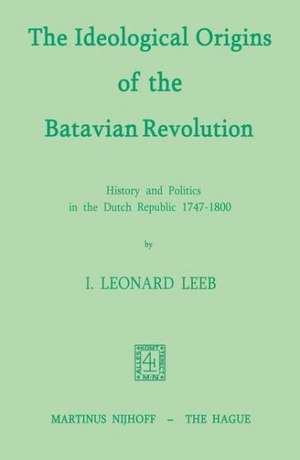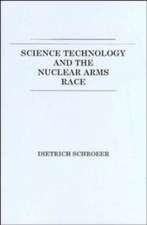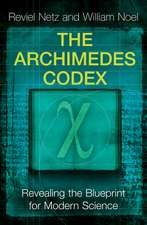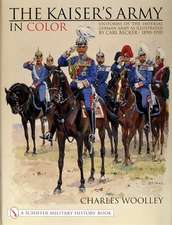The Ideological Origins of the Batavian Revolution: History and Politics in the Dutch Republic 1747–1800
Autor I.L. Leeben Limba Engleză Paperback – 31 iul 1973
Preț: 945.30 lei
Preț vechi: 1152.81 lei
-18% Nou
Puncte Express: 1418
Preț estimativ în valută:
180.90€ • 187.72$ • 151.20£
180.90€ • 187.72$ • 151.20£
Carte tipărită la comandă
Livrare economică 17-31 martie
Preluare comenzi: 021 569.72.76
Specificații
ISBN-13: 9789024751570
ISBN-10: 9024751578
Pagini: 312
Ilustrații: 310 p.
Dimensiuni: 155 x 235 x 16 mm
Greutate: 0.44 kg
Ediția:1973
Editura: SPRINGER NETHERLANDS
Colecția Springer
Locul publicării:Dordrecht, Netherlands
ISBN-10: 9024751578
Pagini: 312
Ilustrații: 310 p.
Dimensiuni: 155 x 235 x 16 mm
Greutate: 0.44 kg
Ediția:1973
Editura: SPRINGER NETHERLANDS
Colecția Springer
Locul publicării:Dordrecht, Netherlands
Public țintă
ResearchCuprins
I. The constitutional argument.- A. The Eighty Years War.- B. The Era of “True Liberty” (Ware Vrijheid).- C. The Oligarchy and Slingelandt.- II. The revolution of 1747 and the Stadhouderate.- A. Invasion and Revolution.- B. Reaction after 1754.- 1. Elie Luzac and the Stadhoudersgezinden.- 2. Jan Wagenaar and the Loevesteiners.- 3. The Shade of Johan de Witt.- III. The development of patriot and orangist ideology.- A. New Ideas and Old History: Socrates and the Beggars.- B. New Organizations: Economic Patriotism.- C. Pieter Paulus on the Stadhouder and the Constitution.- D. Simon Stijl and the New Enlightened History.- E. J.D. van der Capellen, “Born Regent” and Patriot.- IV. The patriots prepare “the democratic revolution”.- A. The Patriot Call to Arms.- B. Hollan’s Wealth: A Summary of the Orangist Position.- C. The Call for Constitutional Restoration.- 1. Political Organization and Patriot Activity.- 2. Political Theory in a Patriot Program.- D. The Response in Theory and Practice.- 1. Sovereignty Defended by A. Kluit.- 2. Patriots and Organists Ready for Battle.- 3. The Failure of the Democratic Patriot Revolution.- V. The end of the constitutional argument220 A. “Civil Liberty” and “Equality” under Orange Restoration.- B. Politics, Philosophy and History in 1793.- 1. S.I. Wiselius: Political Enlightenment.- 2. A. Kluit: The Rights of Man.- C. The End of the Republic, Long Live the Republic.- 1. French Invasion and National Assembly.- 2. The Batavian Republic: Constitution and Coup.- 3. The Old Republic in Retrospect.- Conclusion.

















